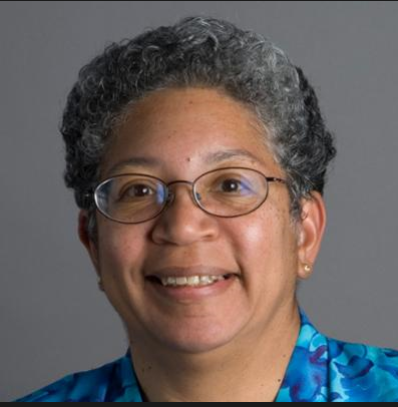Sylvia Perez-Hardy

As a faculty member in GCCIS School of Information Sylvia teaches a variety of different subjects in the information technology domain including data networks, systems administration, database, cybersecurity, and information assurance. In addition to teaching, Sylvia also focuses on curriculum alignment and development for the programs she supports. A fun project has been to develop and teach a course for film science students that focuses on the way data networks and computing systems can be used to effectively and efficiently support post production and broadcasting.
Read her perspective on a few critical thinking questions here:
1. How do you teach or model applied critical thinking?
Most of the courses I teach have a lab component. This affords many opportunities to troubleshoot problems that occur while performing the experiments, analyze the data collected as part of the experiments, and use the resulting analysis to explain the theoretical concepts in the course. Students are guided through troubleshooting the problems they encounter. I use guided paper exercises to give them examples of how to analyze the data and how to use the analysis to explain the protocols and technologies they are learning. In addition, some lab exercises are designed to fail so that the student can experience failure in a safe environment, identify why the failure occurred, and explain what needs to be changed to either correct the situation or prevent the failure from occurring in the future.
2. Why do you think applied critical thinking is important in your domain or role?
I was an IT professional for 25 years before coming to teach at RIT. The essence of my work was to understand a client's requirements and develop a computing solution to address their needs. In addition, when problems arose during deployment or steady state it was necessary to have the ability to analyze the situation and construct a solution. These real life situations are daily events in the life of an IT professional. Critical thinking is more than important, it is essential in every aspect of practice.
3. Can you share a story where quality applied critical thinking was key to your success?
As a rookie Systems Engineer I was deployed to the first installation in the US of a new distributed system. All the required physical planning had been done and the system was physically installed without a problem. However, once the operating system was installed, the system would not communicate with the mainframe it was connected to. After trying what I knew, I headed back to the office and drew a diagram of all the required hardware and software components on the conference room white board. I then gathered a team of SE specialists so that each component was represented. Given the newness of the product and the level of specialization of the SEs, no one had the full picture of how this distributed system needed to be configured to correctly interface with the other computing devices. I facilitated a discussion where at each component intersection the specialist could articulate what need to be configured to make this entire system work. After 4 hours, with a completely documented installation plan I returned to the client's data center and within hours was able to have the system up and running for the client. This experience taught me that critical thinking is often a team sport. Do not isolate yourself and believe you have to come up with the entire solution yourself. Knowing when to engage a team, then identifying and coordinating the appropriate resources is often the key to success.
4. How do you use critical thinking in other areas of your life outside of RIT? And any last critical thoughts?
We are all provided with many opportunities every day to apply our ability to think critically. It is so ingrained in my behavior that it is an automatic process that is engaged whether I am helping my grandson build his newest Lego castle or navigating the complexity of managing my retirement investments.
Critical thinking is an essential life skill. Success in any discipline requires critical thinking whether they are aware of it or not. The ability to think critically should be developed in everyone from infancy and every level of education.